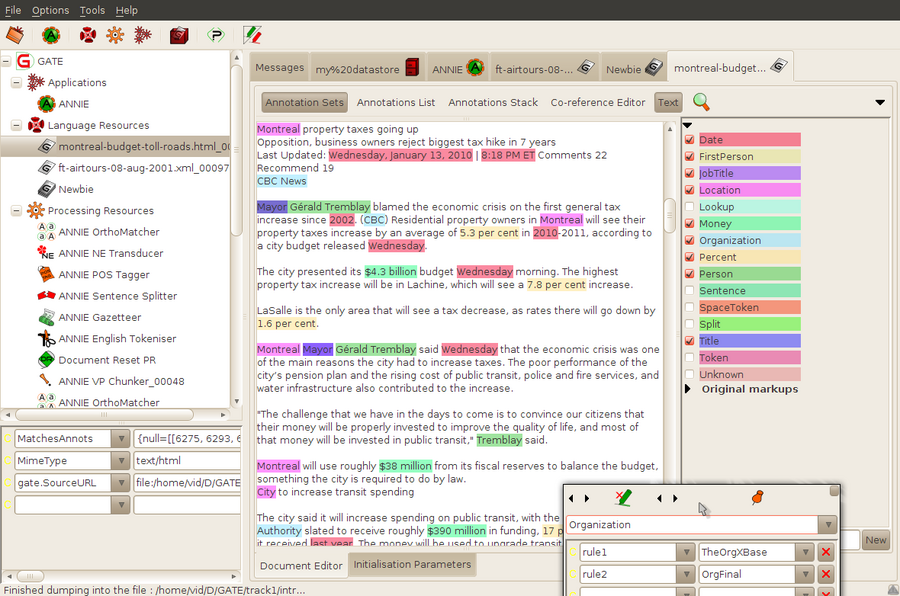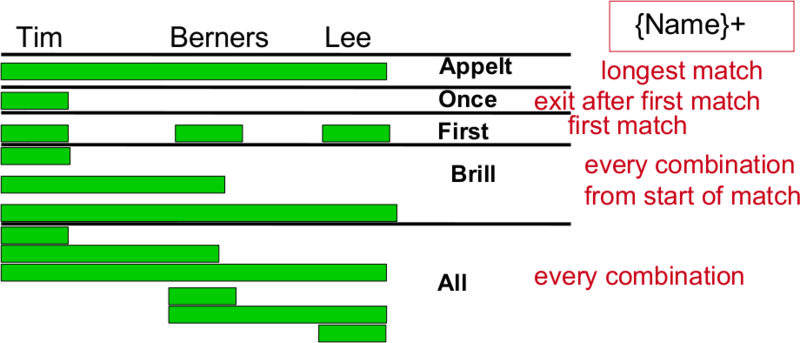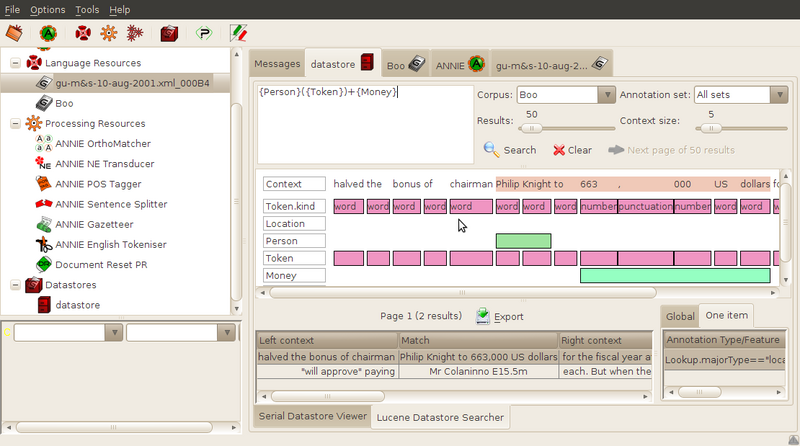GATE track 1 session
A full week of learning GATE text mining/information extraction language processing and talks. Session wiki
GATE is written in Java and very Java centric. This makes it portable, fast, and heavyweight. A programming library is available. It's 14 years old and has many users and contributors.
Using GATE developer
- GATE developer is used to process sets of Language Resources in Corpus using Processing Resources. They are typically saved to a serialized Datastore.
- ANNIE, VG (verb group) processors.
- Preserve formatting embeds tags in HTML or XML.
- Different strengths using GATE's graph (node/offset) based XML vs. preserved formatting (original xml/html)
Information Extraction
- IR - retrieve docs
- IE - retreive structured data
- Knowledge Engineering - rule based
- Learning Systems - statistical
Old Bailey IE project - old english (Online)
- POS - assigned in Token (noun, verb, etc)
- Gazateer - gotcha, have to set initialization parameter listsURL before it's loaded. Must also "save and reinitialize."
- Gazeteer creates Lookups, then transducer creaties named entities
- Then orthomatcher (spelling features in common) coreference associates those
- Annotation Key sets and annotation comparing
- Need setToKeep key in Document Reset for any pre annotated texts
Evaluation / Metrics
- Evaluation metric - mathematically against human annotated
- Scoring - performance measures for annotation types
- Precision = correct / correct + spurious
- Recall = correct / correct + missing
- F-measure is precision and recall (harmonic mean)
- F=2⋅(precision⋅recall / precision+recall)
- GATE supports average, strict, lenient
- Result types - Correct, missing, spurious, partially correct (overlapped)
- Tools > Annotations Diff - comparing human vs machine annotation
- Corpus > Corpus quality assurance - compare by type
- (B has to be the generated set)
- Annotation set transfer (in tools) - transfer between docs in pipeline
- useful for eg HTML that has boilerplate
To investigate
- markupAware for HTML/XML (keeps tags in editor)
- AnnotationStack
- Advanced Options
JAPE
- Rules based on tokens and lookups
Phase: MatchingStyles
Input: Lookup
Options: control = appelt
Rule: Test1
(
({Lookup.majorType == location})?
{Lookup.majorType == loc_key}
):match
-->
:match.Location = {rule=Test1}
Copying features: :match.Location = { type = :match.Lookup.minorType}
To review, gotchas
- Rule types : first takes only first match, excludes compound
- a? b for "a b" will match "a b"
- multiplexor tranducers
- multi-constraint statements
- macros
- To reuse created annotations has to be a separate rule
Matching types
To follow up
- WebSphinx crawler CREOLE plugin
Other notes
Lucene data store and ANNIC
- Use <null> for default set
- Go to Datastore for queries
- eg {Person}({Token})+{Money}
- Useful for debugging JAPE and results
Demos
- Mímir for querying large volumes of data (uses MG4J)
- Translating parts of speech between languages using Compound editor and Alignment editor
- Predicate extractor (MultiPaX)
- Mixed results at best
- OwlExporter
- NLP ontology
Conclusions
While it can do a lot out of the box and benefits from development time and breadth of connectivity, to be useful to more than patient specialists, it needs usability testing. A lot of things are inobvious and too domain specific that with a bit of work could be more broadly useful. Interaction could include a lot more immediate, useful and interesting looking displays. A web based version could have these features. However the team seems somewhat ambivalent about development. :)
Looking forward to learning about programming using GATE libraries.


